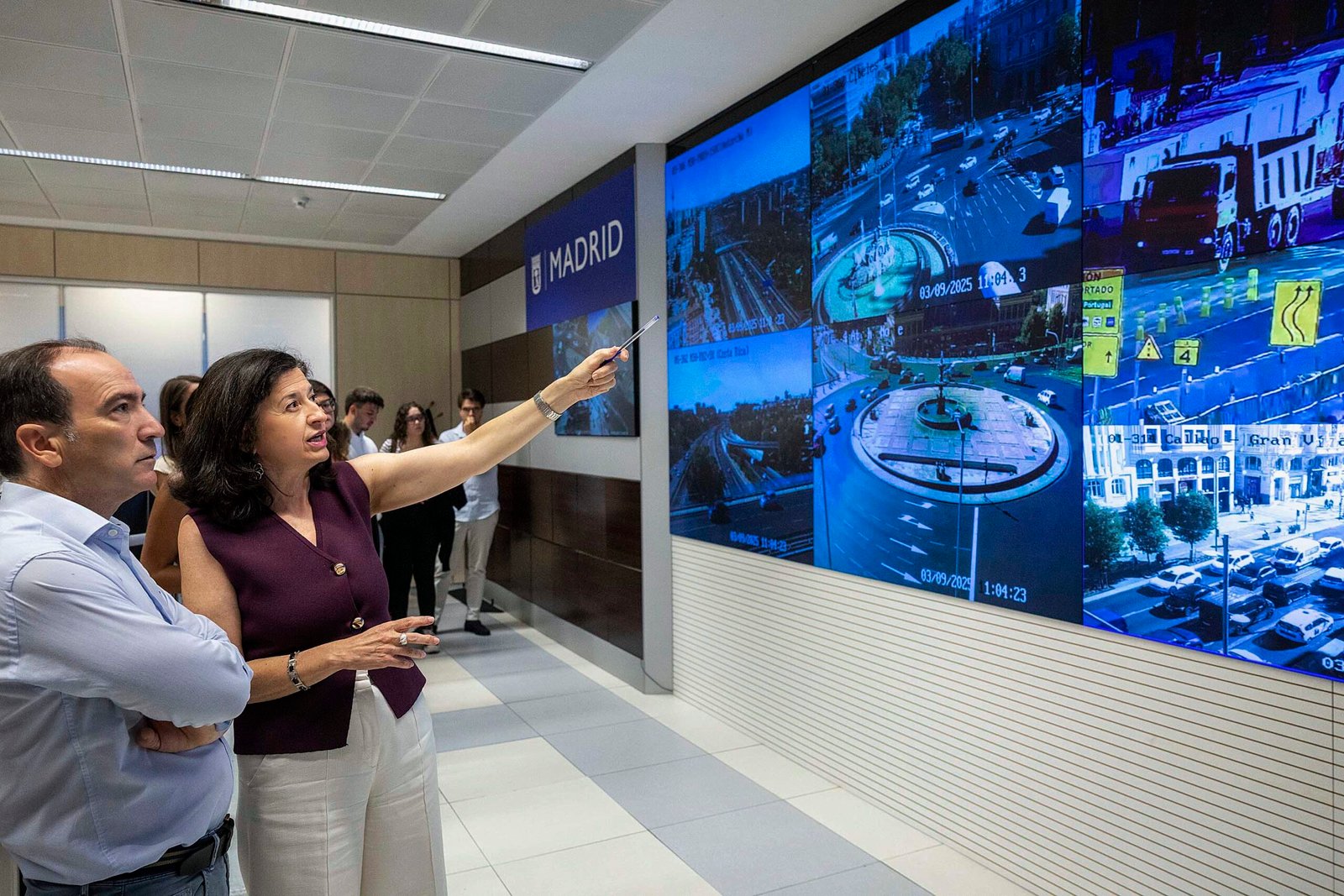Almeida and Sanz at the XX anniversary of Madrid Salud celebrated this Friday at the Palacio de Cibeles
The municipal body Madrid Salud celebrated its first 20 years of existence today at an event held at the Palacio de Cibeles, presided over by the mayor of the capital, José Luis Martínez-Almeida, alongside the deputy mayor and delegate of Security and Emergencies, Inma Sanz. Since its creation in 2005, bringing together the management of the City Council’s competencies in various areas (health promotion, addiction care, food safety, environmental health, vector control, animal protection, or occupational risks), Madrid Salud has promoted the adoption of healthy lifestyles in more than 2.2 million people in Madrid.
Almeida, accompanied by representatives of municipal groups and employees of the organization and its manager, Antonio Prieto, thanked the work of Madrid Salud during this time, two decades in which it has addressed the health of the people of Madrid in a broad sense, focusing on the conditions that allow the prevention of diseases through healthy habits, addressing addictions or food safety, as well as addressing emerging challenges such as unwanted loneliness, gambling addiction, or screen addiction. Furthermore, he highlighted the commitment of the Government team: since he became mayor, the budget of Madrid Salud has increased by almost 40% (38.7%), from the €86.5 million allocated in the 2019 budget to over €120 million for 2025.
In these 20 years, since the management of different areas of action historically ran through different municipal structures in Madrid Salud, this municipal body has carried out millions of interventions and work with the people of Madrid to improve their lives.
Health promotion for around 2.2 million people and a larger municipal network
In terms of health promotion, Madrid Salud has attended to nearly 2.2 million people in recent years, promoting healthy eating for adults and the prevention and management of childhood obesity with the ‘Coles con Alas’ project in the school population; physical activity, including the implementation of routes (WAP) throughout the city (25, with over 127 kilometers marked) and physical activity interventions in its centers; prevention of unwanted loneliness; promotion of healthy sexuality, family planning, and prevention and diagnosis of STIs and HIV; emotional well-being and prevention of complicated grief and suicide; calendar and traveler vaccination; quitting smoking and preventing the start of this habit; memory improvement; support for parenting, in coordination with the Natalidad Promotion Plan; health promotion in the educational field and prevention of accidents and falls.
For this work, Madrid Salud already has 16 municipal centers (called community health centers) distributed throughout the city’s districts. Additionally, it has five specialized centers: the Youth Center, the Cognitive Impairment Prevention Center, the STI and HIV Prevention Center, the Oral Health Center, and the International Health and Vaccination Center, as well as other support centers such as the Safety Assistance Center or the Clinical Analysis and Radiodiagnosis Laboratory, constituting the largest health promotion network in Spain managed by a city council.
Work on addictions with 27,000 people
In the field of addictions, the work of Madrid Salud began in 1987. The organization develops a comprehensive approach to prevention, treatment, and harm reduction with programs aimed at different sectors of the population, with the most comprehensive network in Spain to address addictions. Thus, it has served and worked over the years with around 27,000 people, especially in the seven addiction treatment centers of the City Council (about 19,000) and in early intervention for adolescents and young people (over 8,000).
In this area, it provides comprehensive treatment for substance addictions, but also behavioral addictions (social networks, video games, and sports betting), with different strategies and campaigns. It promotes specific programs and specialized treatment support resources for women, young people, the elderly, dual pathology, and chemsex users. It also offers support to families and intensifies the promotion of social and occupational reintegration. It maintains a network of services focused on harm reduction, mediation, and conflict management for substance use in public spaces, with proximity care services and the opening of an overdose prevention room in Cañada Real. Additionally, it promotes the On-Site Addiction Care Program in the shelters of the homeless care network.
In terms of prevention, it works through early detection and risk detection teams aimed at adolescents and young people, with actions to prevent addictions to gambling, video games, and screen and social media abuse, highlighting the ‘La Contrapartida’ program. It has also launched the PAD Youth Spaces, along with the PAD Night program, aimed at a young-adult audience and focused on reducing risks of alcohol and substance consumption in nightlife spaces.
Many efforts are also focused on the Plan Against Unwanted Loneliness, launched in 2021 and already serving more than 100,000 users, with 10,600 activities carried out. One example is the ‘Vínculos’ service, which seeks to create meeting opportunities that enable the Madrid population to autonomously generate satisfactory interpersonal relationships in their daily lives. Additionally, the autonomous body is committed to combating this feeling in a multidisciplinary way (health promotion programs, reinforcement of healthy habits, creation of support networks…), given that some of the factors that lead to loneliness can be prevented through all of this.
10.5 million interventions in public health
In these 20 years, Madrid Salud technicians have carried out over 10.5 million public health interventions, referring to all those actions or set of sanitary conditions that promote and provide health and, therefore, including, among others, food safety, water quality, air quality, living environment, or animal health risks.
Most of these interventions in recent years (over 10 million) refer to treatments and inspections in the sewer system to prevent pests in the city, as well as actions related to pests (over 220,000 interventions). The Vector Control Department, with over 125 years of history, plays a fundamental role in public health protection in Madrid with these actions of insect control and rat extermination in the sewer system and public spaces, pest control in municipal buildings, and management of alerts for the presence of mosquitoes, wasps, and bedbugs.
The work of Madrid Salud in food safety is also important, working daily to ensure the quality and safety of products reaching the people of Madrid. For example, at Mercamadrid, the main platform for the distribution, marketing, processing, and logistics of fresh foods in Spain, with a team of municipal veterinary inspector staff with official food control functions, has carried out around 66,000 inspections in recent years. Additionally, Madrid Salud acts as the contact point for the Food Alert Network and has a Food Emergency Service (SEAM) that operates continuously throughout the year and has carried out around 2,500 interventions since its implementation.
Likewise, the organization supervises food establishments, product transportation (16,300 actions), and hygienic-sanitary conditions of vehicles, as well as monitoring drinking water (44,000 quality controls) in the municipal area. And the Municipal Public Health Laboratory complements this control with analytical support, covering food safety and environmental quality analysis, a task that extends to monitoring drinking and recreational waters, air quality, drug control for road safety (with around 100,000 samples in the last decade).
In terms of health and animal protection, Madrid Salud has a reference space, the Animal Protection Center (CPA), a benchmark in ensuring the welfare of animals, particularly companion animals, through the collection and care of those that are abandoned or lost, managed by the Municipal Emergency Veterinary Service (SEVEMUR), the management and care of stray animals, or the promotion of responsible adoption of these animals, promoting their integration into new homes. In recent years, over 75,000 animals have been collected and cared for, and over 20,000 pets have been adopted from their Animal Protection Center.
Additionally, feline colonies in the city are managed (about 2,000), with a municipal procedure that has been awarded and improved, implementing, for example, a mediation service, pioneering in the country, in possible conflict situations with neighbors. The cats are sterilized and vaccinated (the Feline Colonies Management Center in Casa de Campo has three operating rooms for sterilization), and there is an information service to the public about these colonies in El Retiro.
Occupational health, work during COVID, and awards
Madrid Salud also takes care of the safety and health of the workers of the City Council and its autonomous bodies. In these 20 years, nearly a million medical examinations and complementary medical tests have been carried out.
During COVID, Madrid Salud professionals played a crucial role, addressing the health crisis from the beginning with numerous actions such as occupational risk prevention, vaccination (over 175,000, in addition to 70,000 PCR tests), carrying out disinfection actions in municipal buildings and vehicles, conducting over 24,000 inspections to verify compliance with measures, developing about 200 guides and protocols for municipal staff, or reinforcing the service to assist confined homeless people. Thus, continuity was achieved in the services provided to the population.
In these 20 years, Madrid Salud has received numerous awards such as the Gold Medal of the Order of Merit of the National Drug Plan; the Accessit Award for Excellence in Public Management in the XIII Edition Award for Quality and Innovation in Public Management; recognition from the Civil Guard for its collaboration with the SEPRONA; the ‘Animal-Friendly Cities’ award as the best municipal program for managing feline colonies; the NAOS Strategy award for promoting physical activity through the ‘Walking People. People who walk’ program, or the Dermosaludable Madrid City award in 2024.
Commemorative exhibition and award ceremony
The event included a tour of the commemorative exhibition located in the Glass Gallery of the Palacio de Cibeles, displaying printed materials and digital displays of Madrid Salud’s activity, as well as some of the unique vehicles used in their daily work.
Madrid Salud also presented 11 awards to entities and individuals for their support and commitment to different areas of activity, in the categories of Occupational Risk Prevention (to Asepeyo and the City Council’s Health and Safety Committee); in the Addiction category (to Fermad Vive Contigo, to the Spanish Red Cross, and to Dr. Néstor Szerman, president of the Dual Pathology Foundation (SEPD) and the World Association of Dual Pathology (WADD)); in the Prevention and Health Promotion category (to CEIP María de Villota, to the General Directorate of Public Space, Works, and Infrastructure, and to Novo Nordisk Pharma); and in the Public Health category (to the Municipal Forum for Animal Protection and Welfare in the City of Madrid, to Hostelería Madrid, and to Canal de Isabel II). /



